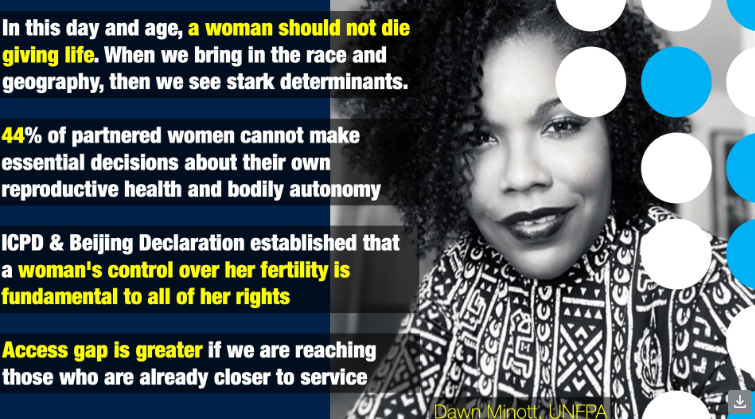Half of Women Lack Control Over Reproductive Health, UN Expert Warns
Ahead of World Health Day 2025, a troubling statistic has come to light: nearly half of women around the world are unable to make decisions about their reproductive health and bodily autonomy.
Dawn Minott, Advisor on Gender and Gender-Based Violence at the United Nations Population Fund (UNFPA), pointed out that 44% of married or in-union women still cannot make essential decisions regarding healthcare, contraception, and sexual rights.
This situation is a significant obstacle in achieving SDG indicator 5.6.1, which aims to measure women’s control over their sexual and reproductive health by 2030.
Minott shared these insights during a special side event at the UN Commission on the Status of Women (CSW69), organized by the Global Center for Health Diplomacy and Inclusion (CeHDI). While there have been gains in reproductive health—such as a 34% decrease in maternal mortality and increased use of contraception—challenges remain, particularly in Sub-Saharan Africa, where women are 130 times more likely to die from pregnancy-related complications compared to women in Europe or North America.
“More than 30 years ago, key international agreements placed gender equality and women’s empowerment at the heart of development,” Minott said. “Control over fertility is fundamental to all of a woman’s rights.” Despite some progress, there are still large disparities in access to reproductive health services, and gender-based violence continues to be a major issue.
Minott also referenced a troubling UN study, which suggests that at the current pace, achieving gender equality could take 300 years. She pointed to the alarming fact that one in five girls worldwide are married before 18, and a woman dies every two minutes from pregnancy or childbirth.
A recent UNFPA report revealed that progress has mostly benefited those who already had access to reproductive health services, further widening the gap for those left behind. Minott called for a more targeted approach, using data to identify and reach the most marginalized women, and emphasized the importance of collecting disaggregated data to inform policies.
“The key challenge now is ensuring that the most marginalized women—those who are often the furthest behind—have access to the services they need,” she said.
Minott also highlighted the lack of integration of sexual and reproductive health and gender-based violence services in humanitarian crises. “We must treat these services as essential, just like food and water,” she said.
On the financial front, Minott noted that every US$1 invested in maternal health yields a return of US$8.40, yet global health financing remains insufficient. Less than 1% of global aid goes toward gender-based violence, and only 1% of health research focuses on women’s health outside oncology. “We must direct more resources toward sexual and reproductive health,” she urged.
Shobha Shukla, Managing Editor of Citizen News Service (CNS), also participated in the discussion, calling for an intersectional approach to reproductive health that considers race, geography, and other factors that impact women’s access to services.
The experts concluded with a call to prioritize sexual and reproductive health in global health budgets and invest in women-led organizations. As we approach the 2030 SDG deadline, these discussions are essential to achieving a more equitable future for women worldwide.



